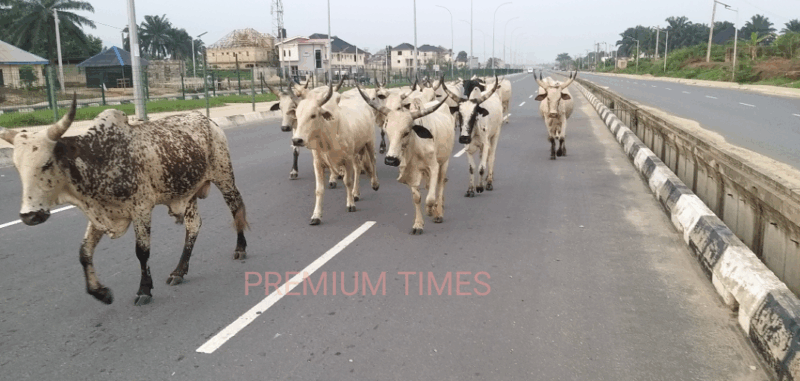A Nigerian senator, Ned Nwoko (APC-Delta), has called for the establishment, development and management of ranches across all 774 local government areas and the Federal Capital Territory (FCT) to enhance food security across the country.
Mr Nwoko, who represents the Delta North District, in an interview with the News Agency of Nigeria, Abuja, on Monday, said that his proposal is contained in a Bill currently before the Senate.
He said the proposal is “A Bill for an Act to Provide for the Establishment, Development, and Management of Ranches in the 774 Local Government Areas and the Federal Capital Territory, to Promote Modern Livestock Farming, Curb Open Grazing, Enhance Food Security, and for Related Matters”.
He explained that the Bill sought to establish a robust legal framework for the development, establishment, and management of ranches across all 774 Local Government Areas (LGAs) and the Federal Capital Territory (FCT) of Nigeria.
The lawmaker is the vice chairperson of the Senate Committee on Environment and the chairperson of the Senate Committee on Reparations and Repatriation.
He said the bill also aimed at promoting modern livestock farming, curbing open grazing, and enhancing food security, and would provide for state-level approvals for land allocation, environmental sustainability in ranch projects, and the transparent management of funding, primarily through public-private partnerships.
“It also outlines the establishment of a dedicated Ranch Management and Development Agency responsible for regulatory oversight, compliance enforcement, and implementation of sustainable ranching practices.
“It will address conflict resolution mechanisms to mediate disputes among stakeholders, while ensuring compliance with stringent environmental and socio-economic guidelines,” he said.
Mr Nwoko further said that the bill would ensure the regulation of ranching operations and related activities to prevent, mitigate, and resolve conflicts arising from open grazing, particularly those between farmers and herders.
“It will help promote the modernisation of livestock farming practices through the establishment of dedicated and legally recognised ranches.
“Facilitate cooperation between the federal and state governments as well as local government councils in the implementation and administration of ranching projects, while respecting constitutional provisions and land tenure laws.
“It will also protect and promote the rights of individuals, communities, and other stakeholders in the allocation, acquisition, and use of land for ranching purposes in a manner consistent with the Land Use Act and other relevant legislation,” the senator said.
He added that it would advance environmental sustainability by ensuring compliance with prescribed environmental standards in the establishment and operation of ranches under this Act.
“The legislation will establish legal mechanisms for the licensing, regulation, monitoring, and enforcement of ranching standards, as prescribed under this Act.”
According to him, it will provide for the welfare, health, and disease control of livestock within ranches, under veterinary laws and best practices.
“Facilitate the resolution of disputes arising from ranching operations through statutory processes and legally recognise mechanisms under this Act.
“Create an enabling environment for private sector participation in ranch development and management, including provisions for financial incentives and partnerships, as well as enhance national food security through the promotion of sustainable livestock production systems and related agricultural activities.”
The senator said that the Bill would ensure equitable compensation and resettlement of individuals and communities whose lands were acquired for the purposes of implementing the Act, and also promote economic development and employment generation through the integration of ranching activities into local economies.
Nigerian govt effort
Many Nigerians previously rejected a proposal for the Nigerian government to build ranches across various states in the country, while some states enacted laws banning the open grazing of cattle. But herders are still seen in some states roaming the roads and farmlands with their cattle.
“(Is) President Tinubu unaware that no sensible country in the world keeps cattle around its capital city?
“Let him point to any major city—from Nairobi to New Delhi, São Paulo to Seoul—where cattle are granted permanent settlements around central governance zones.
“This absurdity is uniquely Nigerian, and disgracefully so,” the outlawed Indigenous People of Biafra said in June, while rejecting President Bola Tinubu’s proposal to establish ranches in Nigeria’s capital, Abuja and other states.
Many have been killed and others displaced in the perennial clashes between nomadic herders and farmers, especially in the northern parts of the country, with one of the most recent being the herders’ attack on the Aye-Twar community in the Katsina-Ala Local Government Area of Benue State on Sunday, 10 August.
PREMIUM TIMES reports that the attack, which spilt into the following day, left homes and worship centres in ruins, worsening the humanitarian crisis already weighing heavily on the displaced residents.
The Nigerian government last year inaugurated a committee to implement the Pulaku Initiative, a large-scale resettlement programme aimed at addressing the root causes of the conflicts and fostering national unity.
Vice President Kashim Shettima inaugurated the committee, chaired by the Minister of Housing and Urban Development, Ahmed Dangiwa, with the representatives of governors of the benefiting states as members.
READ ALSO: Insecurity: Senate considers establishment of modern ranches across Nigeria
The Pulaku initiative, meant to revitalise local communities through the construction of residences, roads, schools, and essential facilities, is initially focused on seven states that have been disproportionately affected by farmers-herders conflicts. They are Sokoto, Kebbi, Benue, Katsina, Zamfara, Niger, and Kaduna states.
Mr Shettima explained that the Pulaku resettlement is “a national commitment to confront a threat that has fuelled distrust and conflicts within communities and across the boundaries of our federation.”
“This non-kinetic solution is not designed to compensate any particular group or region. Therefore, we must cast aside any notion of divisive regionalism and see the Pulaku initiative for what it truly is—a practical response to a shared challenge,” he added.










